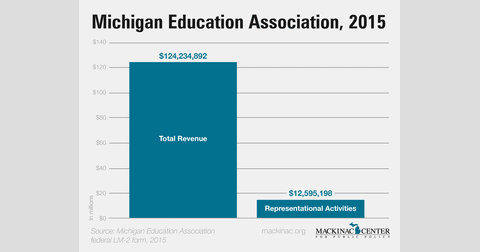Teachers Union Spends Little of Its Funds on Bargaining
MEA spends only 10 percent of funds on 'representational activities'
In 2015, the state’s largest teachers union spent less on its core mission of negotiating contracts for members than at any time since the U.S. Department of Labor began requiring unions to report that aspect of their spending in 2005.
The Michigan Education Association reported costs of $12.6 million for “representational activities” last year, a 12 percent drop from the $14.3 million it spent in 2014. Over the past 10 years, the most the MEA has spent on negotiating and maintaining union contracts was $18.5 million, which happened in 2010.
The teachers union’s report comes at a time when Michigan’s new right-to-work law is freeing a growing number of school employees from having to financially support it without losing their jobs. One of the ways the MEA has responded to the new law is with marketing and advertising campaigns promoting the value it provides for employees.
The union has also imposed obstacles blocking employees who wanted to stop paying dues, such as limiting their exercise of this choice to a narrow window during the month of August. But in 2014, a Michigan administrative law judge ruled this “August opt-out” violated the law.
Additionally, in the months before the new right-to-work law went into effect in 2013, the MEA and some school districts extended collective bargaining agreements for as long as 10 years, delaying implementation of the law for those employees. The law only applies to contracts entered after it went into effect.
The U.S. Department of Labor defines “representational activities” as direct and indirect disbursements to all entities and individuals associated with preparing for and participating in the negotiation of collective bargaining agreements and the administration and enforcement of the agreements made by the labor organization.
MEA officials didn’t respond to an email seeking comment.
The $12.6 million spent on negotiating contracts in 2015 represents 10 percent of the MEA’s total receipts of $124.2 million for the year. The union also spent $3.3 million on political activities and lobbying; $51.6 million on what it called “general overhead”; $5.7 million on “union administration” and $18.8 million on “benefits” for its own staff members.
“Last year, the MEA spent over four times as much on ‘general overhead’ as ‘representation.’ Considering representation already includes the salaries of those negotiating and their materials, MEA members should give careful consideration as to the efficiency of their union,” said F. Vincent Vernuccio, the director of labor policy at the Mackinac Center for Public Policy. “Spending shows priority. The MEA’s financial form makes quite clear the representation is far from the union’s top priority.”
Vernuccio said that under right-to-work, MEA members have a choice as to whether to support the union.
“Hopefully, this choice will force the MEA to serve their members better and spend their money more wisely,” Vernuccio said. “If the union does not learn, they will continue to lose members who do not see value in the top-heavy organization.”
Michigan Capitol Confidential is the news source produced by the Mackinac Center for Public Policy. Michigan Capitol Confidential reports with a free-market news perspective.


 State teachers union loses members, revenue
State teachers union loses members, revenue
 Teachers union distorts record on education spending
Teachers union distorts record on education spending
 Michigan Education Association’s power is on a long decline
Michigan Education Association’s power is on a long decline